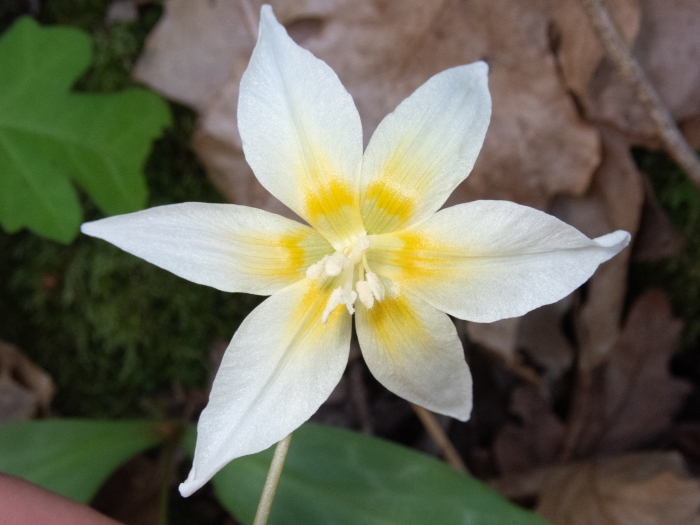California Fawnlily
(Erythronium californicum)
California Fawnlily (Erythronium californicum)
/
/

Don Loarie
CC BY 4.0
Image By:
Don Loarie
Recorded By:
Copyright:
CC BY 4.0
Copyright Notice:
Photo by: Don Loarie | License Type: CC BY 4.0 | License URL: http://creativecommons.org/licenses/by/4.0/ | Rights Holder: Don Loarie | Publisher: iNaturalist | Date Created: 2020-03-21T12:04:31-07:00 |

















































Estimated Native Range
Summary
Erythronium californicum, commonly known as California Fawnlily, is a deciduous perennial herb that is native to the oak woodlands and mixed evergreen forests of California, particularly in the Coast Ranges and the Sierra Nevada foothills. This species thrives in dappled sunlight under the canopy of trees, often in areas with moist, well-drained soils. It grows from a pointed bulb 3 to 6 cm wide and produces two glossy, basal leaves that are mottled with brown, resembling the pattern of a fawn’s coat, which gives the plant its common name. The reddish-green stalks grow up to 30 cm (12 in) tall, each bearing one to three nodding, slightly scented flowers in the spring. The flowers are particularly showy, with yellowish-white tepals 2 to 4 cm long, often adorned with red or brown banding or striping toward the bases, and the stamens, anthers, and stigma are whitish in color.
California Fawnlily is valued for its delicate, ornamental flowers and its ability to naturalize in woodland gardens. It is used in shaded border plantings and naturalized areas where its early spring blooms can be appreciated. The plant prefers partial shade, consistent moisture, and well-drained soils rich in organic matter. It is relatively low maintenance but requires protection from excessive summer dryness. The cultivars ’Brooklamont Inheritance’ and ’White Beauty’ have gained the Royal Horticultural Society’s Award of Garden Merit, indicating their exceptional performance in gardens. While generally pest-free, Erythronium californicum can be susceptible to bulb rot if planted in poorly drained soils. It is not known for aggressive roots or significant disease issues.CC BY-SA 4.0
California Fawnlily is valued for its delicate, ornamental flowers and its ability to naturalize in woodland gardens. It is used in shaded border plantings and naturalized areas where its early spring blooms can be appreciated. The plant prefers partial shade, consistent moisture, and well-drained soils rich in organic matter. It is relatively low maintenance but requires protection from excessive summer dryness. The cultivars ’Brooklamont Inheritance’ and ’White Beauty’ have gained the Royal Horticultural Society’s Award of Garden Merit, indicating their exceptional performance in gardens. While generally pest-free, Erythronium californicum can be susceptible to bulb rot if planted in poorly drained soils. It is not known for aggressive roots or significant disease issues.CC BY-SA 4.0
Plant Description
- Plant Type: Herb
- Height: 0.7-1 feet
- Width: 0.3-0.4 feet
- Growth Rate: Moderate
- Flower Color: Cream, White, Yellow
- Flowering Season: Spring
- Leaf Retention: Deciduous
Growth Requirements
- Sun: Part Shade
- Water: Medium
- Drainage: Slow, Medium
Common Uses
Bee Garden, Bird Garden, Butterfly Garden, Deer Resistant, Edible*Disclaimer: Easyscape's listed plant edibility is for informational use. Always verify the safety and proper identification of any plant before consumption., Fragrant, Hummingbird Garden, Low Maintenance, Rock Garden, Showy Flowers
Natural Habitat
Native to oak woodlands and mixed evergreen forests of California
Other Names
Common Names: Fawn-Lily, White-Beauty, California Fawn-Lily, Gräddvit Hundtandslilja
Scientific Names: , Erythronium californicum, Erythronium revolutum var. bolanderi, Erythronium bolanderi,
GBIF Accepted Name: Erythronium californicum Purdy